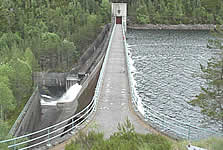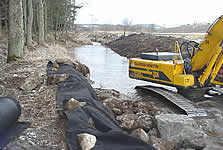In order to meet “Good Ecological Status” the WFD will update existing water pollution regulation in Scotland. Through the Water Environment and Water Services (Scotland) Act, new powers will be given to Scottish Ministers and SEPA to enforce measures aiming to prevent deterioration in aquatic habitats, in the form of the forthcoming “Controlled Activities Regulations”.
In addition to point source discharges, previously controlled by the Control of Pollution Act 1974, the regulations will also bring the abstraction and impoundment of water into the regulatory framework, requiring licences for abstraction for the first time in Scotland.
Furthermore, the regulations will address building and engineering works affecting the physical quality of the freshwater environment, such as the laying of pipeline, gravel extraction, works to control bank erosion, etc.
Activities will be controlled based on the risk of impact on the receiving environment, with levels of control as follows:
- require to be registered with SEPA - minor activities
- require to be registered under ‘General Binding Rules’ - activities that might have an impact if not for the application of rules to prevent pollution
- require a water use licence for operation - major activities.
The controlled activities regulations will be enforced by SEPA and are expected to be finalised over the coming months.
Information on the implementation of the Controlled Activities Regulations can be found by selecting this link.





